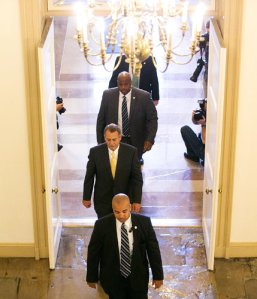I’m writing this the morning after the Republicans in the Senate passed a massive tax reform bill that I doubt many of them, or their staff members, or maybe even leadership had read. The bill wasn’t even printed but evidently photocopies with handwritten insertions and changes were passed out in the hours just before the vote. There were no hearings. And now we get to watch Paul Ryan and Mitch McConnell try to reconcile the House and Senate bills. I wish them no success.
So how is this bill a consequence of sexism? I hadn’t thought about it either until I read this piece by Jill Filipovic in the New York Times. She writes
Many of the male journalists who stand accused of sexual harassment were on the forefront of covering the presidential race between Hillary Clinton and Donald Trump. Matt Lauer interviewed Mrs. Clinton and Mr. Trump in an official “commander-in-chief forum” for NBC. He notoriously peppered and interrupted Mrs. Clinton with cold, aggressive, condescending questions hyper-focused on her emails, only to pitch softballs at Mr. Trump and treat him with gentle collegiality a half-hour later. Mark Halperin and Charlie Rose set much of the televised political discourse on the race, interviewing other pundits, opining themselves and obsessing over the electoral play-by-play. Mr. Rose, after the election, took a tone similar to Mr. Lauer’s with Mrs. Clinton — talking down to her, interrupting her, portraying her as untrustworthy. Mr. Halperin was a harsh critic of Mrs. Clinton, painting her as ruthless and corrupt, while going surprisingly easy on Mr. Trump. The reporter Glenn Thrush, currently on leave from The New York Times because of sexual harassment allegations, covered Mrs. Clinton’s 2008 campaign when he was at Newsday and continued to write about her over the next eight years for Politico.
A pervasive theme of all of these men’s coverage of Mrs. Clinton was that she was dishonest and unlikable. These recent harassment allegations suggest that perhaps the problem wasn’t that Mrs. Clinton was untruthful or inherently hard to connect with, but that these particular men hold deep biases against women who seek power instead of sticking to acquiescent sex-object status.
What these journalists did when they interviewed Mrs. Clinton has the same roots as their sexual harassment.
For arguing that gender shaped the election narrative and its result, feminists have been pooh-poohed, simultaneously told that it was Clinton, not her gender, that was the problem and that her female supporters were voting with their vaginas instead of their brains.
The latest harassment and assault allegations complicate that account and suggest that perhaps many of the high-profile media men covering Mrs. Clinton and Mr. Trump were the ones leading with their genitals. Mr. Trump was notoriously accused of multiple acts of sexual harassment and assault, and was caught on tape bragging about his proclivity for grabbing women. That several of the men covering the race — shaping the way American voters understood the candidates and what was at stake — were apparently behaving in similarly appalling ways off-camera calls into question not just their objectivity but also their ability to cover the story with the seriousness and urgency it demanded.
Filipovic continues
This moment isn’t about a nation of confused men. It’s about a minority of men who choose to treat women alternately as walking sex objects or bothersome and potentially devious nags. It’s about a majority of Americans who give men a pass for all manner of bad behavior, because they assume men are entitled to behave badly but hold women to an entirely different standard.
That is why it’s so egregious that sexual harassers set the tone of much of the coverage of the woman who hoped to be the first female president.
There are at least two other well known men accused of sexual harassment: Senator Al Franken and Garrison Keillor. It is true that both supported Clinton. Both are alleged to have committed an act or acts that, while harassment, are rather on a different scale than Matt Lauer’s or Charlie Rose’s multiple actions. I taught my first workshops about sexual harassment in the late 1970s to managers in Virginia state government and my staff began investigating complaints. The manager who put his hand down an employee’s blouse was suspended; the manager who patted an employee on the rear was reprimanded. No act can be excused, but we need to maintain some perspective.
As Filipovic writes
The 2016 presidential race was so close that any of a half-dozen factors surely influenced the outcome: James Comey, racial politics, Clinton family baggage, the contentious Democratic primary, third-party spoilers, Russian interference, fake news. But when one of the best-qualified candidates for the presidency in American history and the first woman to get close to the Oval Office loses to an opponent who had not dedicated a nanosecond of his life to public service and ran a blatantly misogynist campaign, it’s hard to conclude that gender didn’t play a role.
And what we get is a tax reform bill that will only help the rich, destruction of the environment, alienated allies, and potential nuclear war. Thanks a lot, fellows.





.jpg)
















